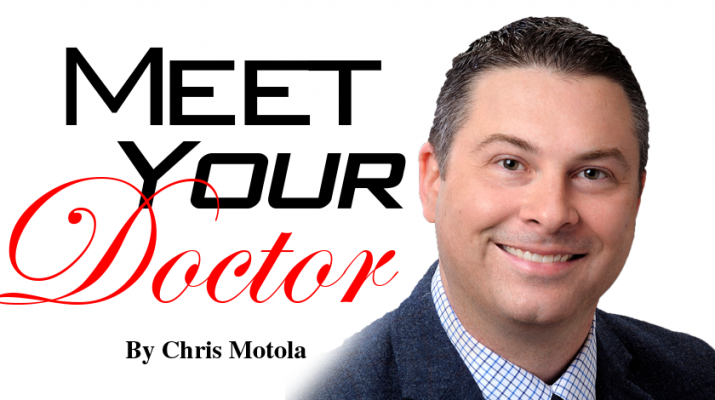New ENT at St. Joe’s discusses vertigo; allergy and problems in the ear, throat, sinus; and the incidence of arthritis in the ears
By Chris Motola
 Q: A lot of people don’t realize how expansive ear, nose, and throat (ENT) is as a specialty. What kinds of issues do you take care of?
Q: A lot of people don’t realize how expansive ear, nose, and throat (ENT) is as a specialty. What kinds of issues do you take care of?
A: My specialized training is in ear surgery, meaning complicated ear disease, surgery for vertigo and hearing implant surgery. I also have some subspecialty certification in allergy treatment and diagnosis, ear infections, tonsil disease, facial and skin lesions, and some bumps and tumors in the head and neck. I take care of all of that.
Q: Are those issues grouped together because their systems are interrelated?
A: Yeah, a lot of the disorders we treat are kind of interrelated. Sometimes what feels like an ear problem is occurring because of a sinus problem. And a lot of ear, throat and sinus problems can be related to allergies. So, yeah, they can be very interrelated if that’s what you’re getting at.
Q: What do allergy treatments look like these days?
A: For whatever reason — it’s probably multifactorial — the Central New York area is a hotbed for allergy-related disorders. But we’ve come a long way with allergy treatments. There are a lot of options. It’s helpful to patients to see a specialist and figure out which of these options will help them. Each treatment option has advantages and disadvantages, whether it’s just using medicine, or using allergy shots, prescription tablets that act like allergy shots. There is a wide variety of treatments and we’re planning on offering all of them through our office very shortly. We’re working on getting all of that stuff set up and ready to go.
Q: How long are the shots effective?
A: The shots are once a week for about a year, then they taper down to once every two weeks or once a week for another year or two. With some people it’ll be a permanent cure. Even if it’s not, it’s usually effective for a decade or more. There are a handful of patients for whom it won’t work, or there will be too many side effects, but the vast majority of patients get a good benefit out of it. It’s also one of the few truly homeopathic treatments that conventional doctors use. Let’s say someone’s allergic to cats or dogs. What we’re doing is using a serum that takes a really tiny amount of the dander or proteins and injecting it into the human body to build up a tolerance. It’s pretty cool if you think about it. The great thing is, it usually works very well, particularly for ears, nose, and throat-related allergies.
Q: And that’s both animal and plant allergies?
A: We can treat allergies to pollen, trees, weeds, grass, mold, cat, dog. We can also treat dust mite allergies, which act a bit like mold. At some point in the future, we hope to be working on doing the same thing for stinging insect venom, but that’s a little further down the road. But those are the things we can do the allergy shots for.
Q: What causes vertigo and how do you treat it?
A: Vertigo is basically the sensation of motion or movement when there isn’t any occurring. You may feel like you or the world is spinning even if there’s no motion. A lot of times it’s related to an inner ear problem. Sometimes you can treat it with physical therapy, sometimes it requires medication, sometimes surgeries are beneficial. It depends on each individuals’ symptoms and circumstances.
Q: How do you treat hearing loss?
A: There are numerous causes of hearing loss, some of which are treated with a hearing aid, some with medication and even some with surgery. I’m trained in the full gamut of those procedures, whether it’s an implantable hearing device, repairing a hole in the ear drum or surgically repairing some arthritis of the tiny little bones in the inner ear.
Q: You can get arthritis in your ear?
A: Yeah. It’s not related to the type you get in your hips, knees or shoulders, but they can get a kind of arthritis. We can identify which of the three tiny bones is having a problem and replace it with an implant. The success rate is very high and has a pretty short recovery time. And it greatly improves quality of life. It’s amazing how socially isolating even a little bit of hearing loss can be. It keeps people out of conversations because they’re not sure what people are saying. So that can make a big difference. That, along with curing a certain kind of vertigo with inner ear surgery, are two of my favorite surgeries to perform.
Q: What can patients do to keep these systems healthy?
A: The things to watch for would be hearing loss, vertigo, sinus infections, sore throats, sleep problems, nasal blockage. All those kinds of things people should be watchful of. Allergies. As far as keeping them healthy, that’s easier said than done. A lot of the disorders we see don’t really have much of a way to prevent them, or they’re congenital or hereditary in some way. Of course, one of the best things people can do is, if they’re using nicotine in some way, cutting it out of their diet is extremely helpful and the best preventive thing you can do.
Lifelines
Name: Tucker M. Harris, M.D.
Position: Otolaryngologist and allergist at St. Joseph’s Health, Northeast Medical Center in Fayetteville; previously worked as an otolaryngologist for Arnot Medical Services and Arnot Ogden Medical Center in Elmira, where he served as medical director of otolaryngology and medical director of otology
Hometown: Clancy, Mont.
Education: Oregon Health and Science University; completed his residency in the department of otolaryngology and communication sciences at SUNY Upstate Medical University and Veterans Administration Medical Center in Syracuse; completed his fellowship in otology/neurotology at SUNY Upstate Medical University.
Affiliations: St. Joseph’s Health
Organizations: Otolaryngology-Head and Neck Surgery (ABOHNS); fellow in the American Academy of Otolaryngic Allergy (AAOA); holds a NYS Medical License, Drug Enforcement Agency certification and is certified in basic life support.
Family: Wife, three children (ages 9, 5 and 2)
Hobbies: SU sports; playing drums, spending time on boat, spending time with family

